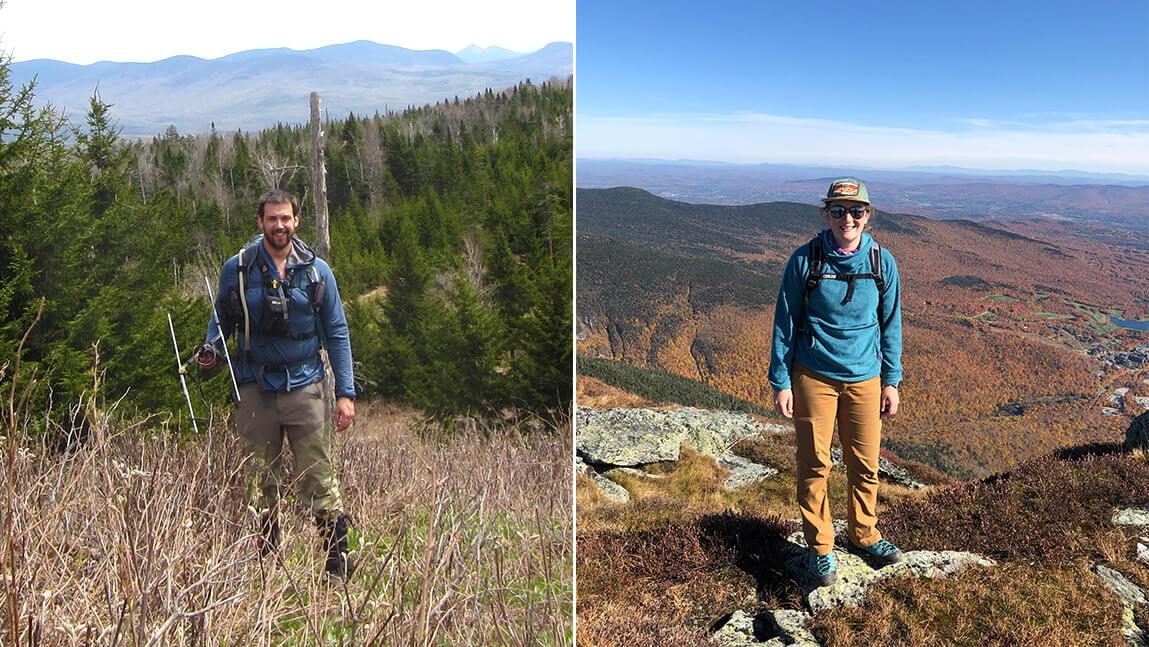“My service on the board of the Green Mountain Club gave me a detailed picture of the role an ecologist can play in working with a nonprofit recreation organization to conserve and manage natural resources,” said Kenna Rewcastle ’21, a PhD student in the University of Vermont Rubenstein School of Environment and Natural Resources. Rewcastle, who is studying the impact of climate change on mountain ecosystems, participated in an inaugural group of Rubenstein School Nonprofit Board Fellows.
In 2017, Carolyn Goodwin Kueffner, the School’s graduate program coordinator, partnered with Rubenstein School board member Sarah Muyskens, former Secretary of the Vermont Agency of Natural Resources Deborah Markowitz, and Rubenstein School Dean Nancy Mathews to create the Rubenstein School Nonprofit Board Fellows Program.
“Placing outstanding graduate students in the community through a board residency program aligns with the Rubenstein School’s vision, core values, and strategic goal of building relationships with our stakeholders,” said Mathews. “The program helps students develop the leadership skills to be more effective in either the for-profit or nonprofit sectors, where the need for environmental leadership continues to grow rapidly.”
The program provides students with a two- to three-year experience and the nonprofit with an opportunity to learn from student perspectives and their research. All PhD students who have been matriculated in the Rubenstein School graduate program for at least six months are eligible to apply.
“The program enables our graduate students to gain real-world experience and provide service while learning about community impact,” said Goodwin Kueffner, who retired from UVM in spring 2021 but who will continue to manage the Nonprofit Board Fellows Program.
The Board Fellows Program pairs exceptional PhD students with local nonprofit environmental boards in a non-voting capacity, but the Fellows often contribute as if they are voting members in the activities of the boards.
“Our Board Fellows, similar to Trustees, provide expertise, advice, and support in developing and implementing our conservation strategies,” said Heather Furman, State Director of The Nature Conservancy in Vermont, which has now hosted six Board Fellows. “Their academic knowledge and expertise in recent environmental studies adds to richer and deeper board debates; they offer meaningful contributions to the development of our strategic plan; and they engage in our policy work.”
During the program’s pilot years of 2018-2020, a group of seven graduate students were matched with three local organizations: ECHO, Leahy Center for Lake Champlain; Green Mountain Club; and The Nature Conservancy in Vermont. Due to the success of the program, this initial group of students extended their board fellow relationship for an additional year and finished at the end of May 2021.
“The Board Fellows Program helped me network with active community members,” said Elias Rosenblatt ’21, an inaugural Board Fellow with ECHO, Leahy Center for Lake Champlain and a PhD student studying the health and genetics of moose in Vermont and New England. “The experience gave me a unique opportunity to relate research in the region to education and museum exhibits and to contribute my expertise as a research scientist with people in the nonprofit and state government sectors.”
“Our Fellows had an important voice in our board meetings,” said Phelan Fretz, Executive Director of ECHO, Leahy Center for Lake Champlain, which has supported four Fellows. “ECHO is all about science and what it can do, yet science is not often found in the board room where meetings are usually about business and networking. The Fellows brought ‘science rigor’ to the board, and their PhD pursuits helped us ground our work in recent research.”
Previous Board Fellows have been pleasantly surprised at the diverse range of experiences they have had during their board placements. Rewcastle found that she contributed to two very different Green Mountain Club (GMC) initiatives.
“As a young, female, LGBTQ-identifying individual, I was able to provide a unique perspective during board discussions of how the GMC can make its mission and its resources more accessible to a younger, more diverse generation of trail users,” said Rewcastle. “As an ecologist, I advocated for greater use of the Long Trail and GMC properties for educational purposes in partnership with UVM and Vermont high schools.”
Rewcastle will continue participating in a GMC Land Conservation Committee initiative to develop a strategy for systematically prioritizing land protection projects as the GMC closes in on permanently protecting the entire Long Trail and looks to future conservation projects throughout the larger Long Trail System network.
“As I near the end of my PhD, I am actively seeking out land management positions in various organizations and government agencies,” said Rewcastle, “and I feel much more prepared to submit successful applications for these jobs given my experience at the Green Mountain Club.”
“Board Fellows provide a much-needed link to a younger generation of conservationists that are vital to the growth and future of environmental organizations,” said Furman.
The opportunity with ECHO has inspired Rosenblatt to take his Rubenstein School graduate education and research experience and to seek work with a mission-driven, non-profit organization. “With my experiences on a nonprofit board, I feel competent in leading research and outreach initiatives in this sector,” he said.
The success of the Nonprofit Board Fellows Program has encouraged the Rubenstein School to add two more nonprofits, Vermont Parks Forever and The American Chestnut Foundation Vermont/New Hampshire Chapter, to its roster of partner organizations. This year the program and its partners are supporting six fellows.
"We are so inspired by the success of this program,” said Goodwin Kueffner. “Our Fellows have gained invaluable real-world experience; our partner organizations have benefited from the fine work of the Fellows; and the Rubenstein School has strengthened connections with community partners. We hope to grow the program to include more students and organizations in the future."
